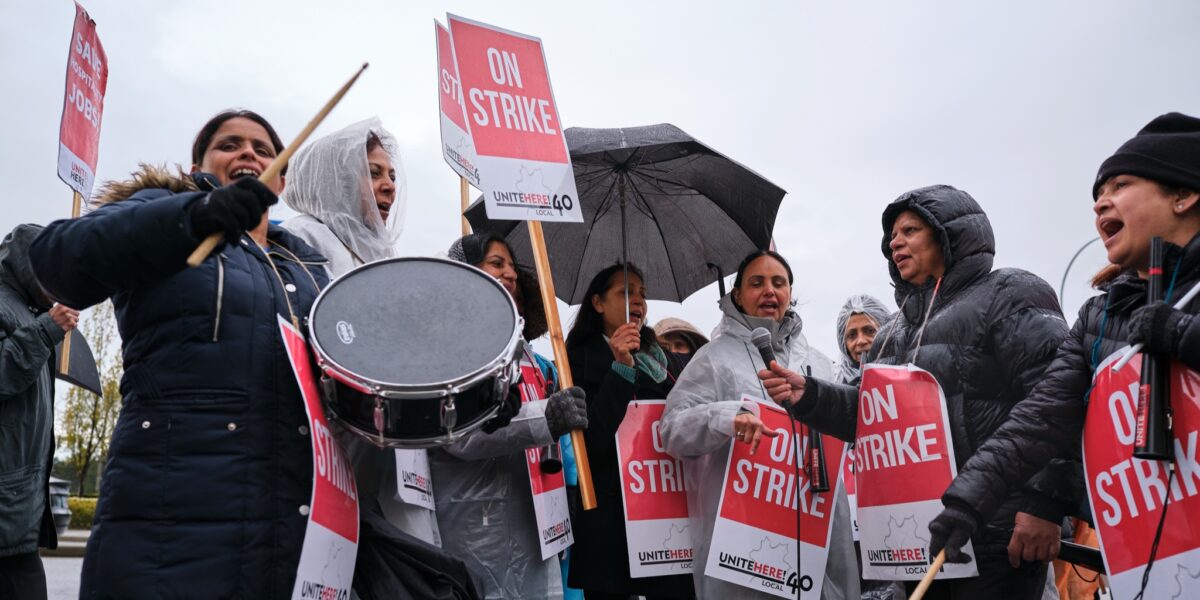A scrappy, energetic union representing hotel workers in BC has just won an important victory, forcing three of Vancouver’s downtown luxury hotels to sign an unprecedented contract that will see workers receive the highest wages for Canadian hotel workers ever. In a November 21, 2024 press release, UniteHere Local 40 said that its members at Hyatt Regency, Westin Bayshore, and Pinnacle Waterfront will enjoy a cumulative raise of 34 per cent by 2027. Under the new agreement, a room attendant will earn nearly $32.50 per hour on January 1 and will make over $37 per hour in 2027. The improved wages won by militant struggle of a workforce that is typically female and brown compare favorably with this year’s calculated Living Family Wage minimum of $27.05 for this year.
“This contract is a game-changer for us. We are proud of what our union won in this contract fight,” said Naden Abenes, a Hyatt room attendant. “The new wage increases will help us afford to live in Vancouver, and other gains we made, like year-around health benefits for everyone, means we can take better care of our families without constant worry.”
Other contract gains being celebrated by the membership that fought so hard to win them include a successful push back against management proposals to cap health care and against other suggested concessions. This push back was significant for a workforce that has a high level of on-the-job injuries .
Being a room attendant in a hotel can be back-breaking work, and the injury rates these hard-working women endure are often linked to work quotas that drive them past endurance.
In a survey of more than 600 hotel housekeepers in the US and Canada, 91 per cent said that they have suffered work-related pain. Of those who reported workplace pain: 77 per cent said their workplace pain interfered with routine activities. Two-out-of-every-three workers visited their doctor to deal with workplace pain. Sixty-six per cent took pain medication just to get through their daily work quota.
Local 40 picket lines are a common sight in BC’s Lower Mainland these days and are notable for the high spirits and loud music that often accompany them.
UniteHere Local 40 President Zailda Chan said: “Vancouver’s hotel workers have set a new standard for Canada’s hospitality industry. The achievements in this agreement are a testament to the power of workers and the critical role Local 40 members play in the success of Vancouver’s tourism sector.”
Local 40’s militance and determination represent a fighting tradition that goes back more than a century to the early days of the North American labour movement.
The Triangle Shirtwaist Fire in 1911 that killed 146 workers in New York City, most of them young, immigrant women, was a turning point for the union that became UniteHere. Workers –led by young immigrant women–fought to win safe workplaces and union rights that continue to benefit workers today.
The union’s online account of its history notes that: “In the years that followed, our union ancestors laid the groundwork to make textile, garment, laundry, and hospitality jobs good, family-sustaining jobs. They also took the fight for justice outside the workplace. In the 1960s, New York’s HERE locals marched in support of lunch counter sit-ins to end segregation in the South. Forty years later, UNITE HERE led the labor movement to reverse its position on immigrant labor and advocate for immigration reform, organizing the Immigrant Workers’ Freedom Ride in 2003 to counter anti-immigrant bigotry and xenophobia in the wake of 9/11.”
At a moment when the business class press is ramping up its attacks on workers and workers’ struggles, particularly in the repetitive drum beat of insults aimed at postal workers and others who have the nerve to stand up to their employer and fight for job security and better benefits, it is important to remember the lessons taught by UniteHere Local 40’s victory in BC.
The militant membership’s three-hotel victory is the result of years of organizing, public outreach and relentlessly determined action. There are lessons here for all Canadian workers, and for all who consider themselves friends of labour. Briefly put, the lessons that stand out for this observer are simple. When we fight, we win. We are weakened if we let the employer class’s divide and conquer strategies split us up on racial and gender lines. Solidarity from other workers and from the general public can make a difference, and the employer is unlikely to make concessions unless we mobilize enough pressure. As one veteran organizer of my acquaintance likes to say, “ If you want the employer to see the light, you have to turn up the heat!”



